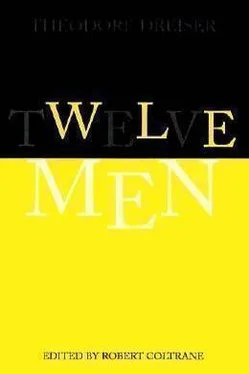Теодор Драйзер - Twelve Men
Здесь есть возможность читать онлайн «Теодор Драйзер - Twelve Men» весь текст электронной книги совершенно бесплатно (целиком полную версию без сокращений). В некоторых случаях можно слушать аудио, скачать через торрент в формате fb2 и присутствует краткое содержание. Год выпуска: 2014, Издательство: epubBooks Classics, Жанр: Биографии и Мемуары, на английском языке. Описание произведения, (предисловие) а так же отзывы посетителей доступны на портале библиотеки ЛибКат.
- Название:Twelve Men
- Автор:
- Издательство:epubBooks Classics
- Жанр:
- Год:2014
- ISBN:нет данных
- Рейтинг книги:4 / 5. Голосов: 1
-
Избранное:Добавить в избранное
- Отзывы:
-
Ваша оценка:
- 80
- 1
- 2
- 3
- 4
- 5
Twelve Men: краткое содержание, описание и аннотация
Предлагаем к чтению аннотацию, описание, краткое содержание или предисловие (зависит от того, что написал сам автор книги «Twelve Men»). Если вы не нашли необходимую информацию о книге — напишите в комментариях, мы постараемся отыскать её.
Twelve Men — читать онлайн бесплатно полную книгу (весь текст) целиком
Ниже представлен текст книги, разбитый по страницам. Система сохранения места последней прочитанной страницы, позволяет с удобством читать онлайн бесплатно книгу «Twelve Men», без необходимости каждый раз заново искать на чём Вы остановились. Поставьте закладку, и сможете в любой момент перейти на страницу, на которой закончили чтение.
Интервал:
Закладка:
He flung a parting shot at his superior as I departed.
"Tell him that I'll sign fer thim when I get thim, an' not before," he declared.
I went on my way, knowing full well that no such message was for delivery, and that he did not intend that it should be. It was just the Irish of it. I went off to Woodlawn and secured the bolts, after which I went down to the "ahffice" and reported. There I found the chief clerk, a mere slip of a dancing master in a high collar and attractive office suit, who was also in a high state of dudgeon because Rourke, as he now explained, had failed to render an o.k. for this and other things, and did not seem to understand that he, the chief clerk, must have them to make up his reports. Sometimes o.k.s did not come in for a month or more, the goods lying around somewhere until Rourke could use them. He wanted to know what explanation Rourke had to offer, and when I suggested that the latter thought, apparently, that he could leave all consignments of goods in one station or another until such time as he needed them before he o.k.ed for them, he fairly foamed.
"Say," he almost shouted, at the same time shoving his hands distractedly through his hair, "what does he think I am? How does he think I'm going to make up my books? He'll leave them there until he needs them, will he? Well, he's a damned fool, and you go back and tell him I said so. He's been long enough on the road to know better. You go back and tell him I said that I want a signed form for everything consigned to him the moment he learns that it's waiting for him, and I want it right away, without fail, whether it's a single nut or a car of sand. I want it. He's got to come to time about this now, or something's going to drop. I'm not going to stand it any longer. How does he think I'm going to make up my books? I wish he'd let you attend to these matters while you're up there. It will save an awful lot of trouble in this office and it may save him his job. There's one thing sure: he's got to come to time from now on, or either he quits or I do."
These same o.k.s plus about twenty–five long–drawn–out reports or calculations, retroactive and prospective, covering every possible detail of his work from the acknowledgment of all material received up to and including the expenditure of even so much as one mill's worth of paper, were the bane of my good foreman's life. As I learned afterward, he had nearly his whole family, at least a boy and two girls, assisting him nights on this part of the work. In addition, while they were absolutely of no import in so far as the actual work of construction was concerned—and that was really all that interested Rourke—they were an essential part of the system which made it possible for him to do the work at all—a point which he did not seem to be able to get clear. At the same time, there was an unsatisfactory side to this office technicalia, and it was this: If a man could only sit down and reel off a graphic account of all that he was doing, accompanied by facts and figures, he was in excellent standing with his superiors, no matter what his mechanical defects might be; whereas, if his reports were not clear, or were insufficient, the efficiency of his work might well be overlooked. In a vague way, Rourke sensed this and resented it. He knew that his work was as good as could be done, and yet here were these constant reports and o.k.s to irritate and delay him. Apparently they aided actual construction no whit—but, of course, they did. Although he was a better foreman than most, still, because of his lack of skill in this matter of accounting, he was looked upon as more or less a failure, especially by the chief clerk. Naturally, I explained that I would do my best, and came away.
When I returned, however, I decided to be politic. I could not very well work with a pick and shovel, and this was about all that was left outside of that. I therefore explained as best I could the sad plight of the chief clerk, who stood in danger of losing his job unless these things came in promptly.
"You see how it is, Rourke, don't you?" I pleaded.
He seemed to see, but he was still angry.
"An o.k. blank! An o.k. blank!" he echoed contentiously, but in a somewhat more conciliatory spirit. "He wants an o.k. blank, does he? Well, I expect ye might as well give thim to him, thin. I think the man lives on thim things, the way he's aalways caallin' fer thim. Ye'd think I was a bookkeeper an' foreman at the same time; it's somethin' aaful. An o.k. blank! An o.k. blank!" and he sputtered to silence.
A little while later he humorously explained that he had "clane forgot thim, anyhow."
The ensuing month was a busy one for us. We had a platform to lay at Morrisania, a chimney to build at Tarrytown, a sidewalk to lay at White Plains, and a large cistern to dig and wall in at Tuckahoe. Besides these, there were platforms to build at Van Cortlandt and Mount Kisco, water–towers at Highbridge and Ardsley, a sidewalk and drain at Caryl, a culvert and an ash–pit at Bronx Park, and some forty concrete piers for a building at Melrose—all of which required any amount of running and figuring, to say nothing of the actual work of superintending and constructing, which Rourke alone could look after. It seemed ridiculous to me at the time that any one doing all this hard practical labor should not be provided with a clerk or an accountant to take at least some of this endless figuring off his hands. At the same time, if he had been the least bit clever, he could have provided himself with one permanently by turning one of his so–called laborers into a clerk—carrying a clerk as a laborer—but plainly it had never occurred to him. He depended on his family. The preliminary labor alone of ordering and seeing that the material was duly shipped and unloaded was one man's work; and yet Rourke was expected to do it all.
In spite of all this, however, he displayed himself a masterful worker. I have never seen a better. He preferred to superintend, of course, to get down into the pit or up on the wall, and measure and direct. At the same time, when necessary to expedite a difficult task, he would toil for hours at a stretch with his trowel and his line and his level and his plumb–bob, getting the work into shape, and you would never hear a personal complaint from him concerning the weariness of labor. On the contrary, he would whistle and sing until something went wrong, when suddenly you would hear the most terrific uproar of words: "Come out av that! Come out, now! Jasus Christ, man, have ye no sinse at aall? Put it down! Put it down! What arre ye doin'? What did I tell ye? Have ye no raison in ye, no sinse, ye h'athen nagur?"
"Great heavens!" I used to think, "what has happened now?"
You would have imagined the most terrible calamity; and yet, all told, it might be nothing of any great import—a little error of some kind, more threatening than real, and soon adjusted. It might last for a few moments, during which time the Italians would be seen hurrying excitedly to and fro; and then there would come a lull, and Rourke would be heard to raise his voice in tuneful melody, singing or humming or whistling some old–fashioned Irish "Come–all–ye."
But the thing in Rourke that would have pleased any one was his ready grasp for the actualities of life—his full–fledged knowledge that work is the thing, not argument, or reports, or plans, but the direct accomplishment of something tangible, the thing itself. Thus, while I was working with him, at least nothing that might concern the clerical end of the labor could disturb him, but, if the sky fell, and eight thousand chief clerks threatened to march upon him in a body demanding reports and o.k.s, he would imperturbably make you wait until the work was done. Once, when I interrupted him to question him concerning some of these same wretched, pestering aftermaths of labor, concerning which he alone could answer, he shut me off with: "The reports! The reports! What good arre the reports! Ye make me sick. What have the reports to do with the work? If it wasn't fer the work, where would the reports be?" And I heartily echoed "Where?"
Читать дальшеИнтервал:
Закладка:
Похожие книги на «Twelve Men»
Представляем Вашему вниманию похожие книги на «Twelve Men» списком для выбора. Мы отобрали схожую по названию и смыслу литературу в надежде предоставить читателям больше вариантов отыскать новые, интересные, ещё непрочитанные произведения.
Обсуждение, отзывы о книге «Twelve Men» и просто собственные мнения читателей. Оставьте ваши комментарии, напишите, что Вы думаете о произведении, его смысле или главных героях. Укажите что конкретно понравилось, а что нет, и почему Вы так считаете.









